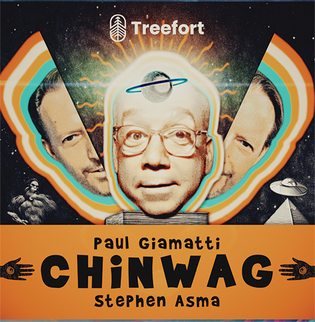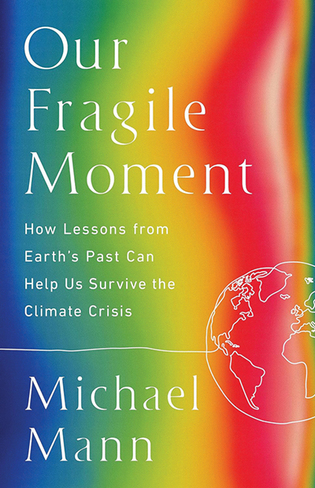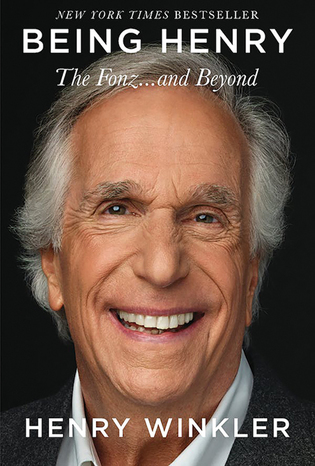
Chinwag
Podcast by Paul Giamatti ’89, ’94MFA, and Stephen Asma
Treefort Media
Reviewed by Mark Blankenship ’05MFA
It sounds like something you’d discuss with your friends over your fourth round at the pub: what if the Loch Ness monster is actually a ghost? What if all “lake beasts” are just spectral echoes that refuse to leave this mortal coil? What would that say about the universe?
But these aren’t barroom musings. They’re the engine behind a recent episode of Chinwag, the podcast hosted by actor Paul Giamatti ’89, ’94MFA, and Stephen Asma, a philosophy professor at Columbia College Chicago. The two friends share an interest in “the unexplained,” which means they’re eager to discuss everything from monsters to aliens to social phenomena like the Mandela effect. That might make them sound like members of a tinfoil hat society, but the trick is that they’re erudite and funny. Their niche interests are less important than the joy they take in being curious about things.
The effect is dazzling. Their minds are so agile that they can connect a theory about the multiverse to the reason their kids enjoy movies like Apocalypse Now. Their enthusiasm is so genuine that they can revel in the idea of a ghostly sea creature.
In most episodes they bring a famous guest along for the ride, and when the visitor shares their vibe, it’s a blast. In a conversation about people who live to be one hundred, Tom Hanks not only delivered some excellent scholarly references, but also made a top-notch joke about the uselessness of climbing stairs. Patton Oswalt riffed so well on how movies reflect the presidency under which they’re made that he could publish a book. This just expands the sense that Chinwag is a dinner party for a particularly charming group of friends.
But it’s the hosts who truly shine. Giamatti is more the comedian and Asma is more the straight man, but their dynamic is built on respect. They seem content to let each other follow their impulses down any old road, up to and including episodes when Giamatti reads entire stories by O. Henry and Edgar Allan Poe. The show is defined by these detours, and that’s the point. Conversations are more fun if you can’t predict where they’re going.
Mark Blankenship has written about the arts and culture for over 20 years. He is the bureau chief of The Food Section: Nashville.
__________________________________________________________________

Our Fragile Moment: How Lessons from Earth’s Past Can Help Us Survive the Climate Crisis
Michael E. Mann ’98PHD
PublicAffairs, $30
Reviewed by Bruce Fellman
“We live on a Goldilocks planet,” writes Michael E. Mann ’98PhD, a climatologist at the University of Pennsylvania. “It is neither too hot nor too cold, seemingly just right for life.” Yet the benevolent conditions that have enabled human civilizations to develop and flourish over the last 6,000 years are now increasingly fragile. Since the dawn of the industrial age, our species has been doing everything possible to put Goldilocks on the run.
The culprit causing global climate change is our reliance on fossil fuels. A quarter-century ago, Mann and his colleagues published their famous “hockey stick” graph: a plateau, starting around 1400 AD; then a slow increase; and then, in the early 1900s, a fast increase. By constantly burning oil, coal, and natural gas, humans have produced a “greenhouse” that traps more and more heat, raising the temperature of the planet. Glaciers are melting, many coastal areas are flooding, wildfires are becoming larger and more frequent, and the number and ferocity of major hurricanes is rising.
The volatility of the planet’s support systems goes back billions of years. Earth, Mann shows, has undergone a number of dramatic climate-driven shifts. All of them—including an episode of wholesale freezing about two billion years ago, as well as a sweltering global hothouse some 55 million years ago—were natural.
Mann has produced an instructive and compelling account of key epochs in which Earth’s “geologic thermostat” failed, and life itself could have disappeared. Most chapters end with “Lessons Learned”: cautionary tales that apply, or don’t, to our own “fragile moment.” Taken together, these portraits of our Earth’s resilience give the reader hope. We don’t have to throw up our hands in resignation. As Mann consistently points out, humans have the means to reverse course.
“There is urgency, but there is agency too,” Mann counsels. His wonderfully readable book is a call to action.
Bruce Fellman is a veteran science writer.
__________________________________________________________________

Being Henry
Henry Winkler ’70MFA
Celadon Books, $30
Reviewed by brin solomon ’14
Some celebrity auto-biographies are exercises in ego, page after page filled with the author’s insistence on their own greatness—but not Being Henry, Henry Winkler’s new account of his life and career. Despite having a career spanning more than 50 years and winning some of the profession’s highest honors, Winkler writes about his time in Hollywood with the wide-eyed enthusiasm of a student actor stepping onto the Paramount lot for the very first time.
The book largely comprises a series of thumbnail vignettes that slip easily back and forth over the years. A reminiscence from the early seasons of I will lead to a story about his costar’s subsequent directing career, which will lead in turn to an episode illustrating one of Winkler’s own directorial insights, before we return to his time as the Fonz a chapter or two later. Winkler sketches these vignettes with a light touch, and the result sometimes feels more like a transcript of a lively dinner guest’s banter than a cohesive whole. A story about a chance encounter with a descendant of a man his father worked for before fleeing Nazi Germany is given equal weight with a story about taping deli meat to his shoes to win over a pet dog, and some of the punchlines to his comedic bits are left as an exercise for the reader.
Still, the book is brimming over with warmth, and some of the behind-the-scenes tidbits he reveals are bound to be coveted trivia for years to come. But the finest moments of Being Henry are in the chapters when Winkler’s wife, Stacy Weitzman, has a chance to offer her take on the couple’s relationship over the years. Here, the pell-mell pace slows and the text lifts into something simple and profound: a portrait of an entwined life.
brin solomon ’14 is a composer, playwright, and liturgist.
 loading
loading

